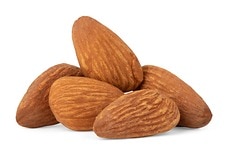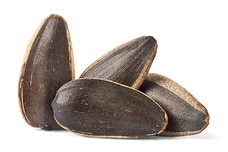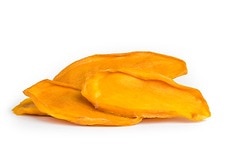Vitamin E (Tocopherols)
Vitamin E is a group of antioxidant compounds. They are fat-soluble, meaning they need lipids to absorb and dissolve. There are two natural forms known as tocopherols and tocotrienols, the latter being much less known or researched.
The chemical forms of vitamin E include alpha, beta, gamma, and delta (-tocopherol and -tocotrienol). Alpha-tocopherol is the only form that meets the nutritional requirements of the human body.
Sources of Vitamin E
Vitamin E is found in a number of healthy, delicious foods. Good food sources of vitamin E include:
- Vegetable oils, like sunflower, safflower, and corn oil
- Avocados
- Spinach
- Sunflower seeds
- Wheat germ
- Nuts, such as almonds, hazelnuts, and peanuts
- Peanut butter
- Broccoli
- Kiwi
- Mango
- Tomato
Vitamin E Nutrition Information
As an antioxidant, vitamin E protects the body from free radical damage and thus may help prevent cancer, and may also help prevent chronic illnesses like heart disease by averting the harmful oxidation caused by free radicals. It also plays an essential role in maintaining the structure and function of the skeletal, cardiac, and smooth muscle systems. It’s also been found to aid in the formation of red blood cells in addition to regulating the body’s use of iron, selenium, Vitamin A, and Vitamin K. Some studies also indicate that vitamin E may strengthen the immune system.
Vitamin E Deficiency
Vitamin E deficiency is rare and symptoms of a deficiency have yet to be found in otherwise healthy individuals who lack vitamin E in their diet. While rare, vitamin E deficiency is possible in people with:
- Fat-malabsorption disorders that hinder the body’s ability to break down fat
- Premature or low birth weight infants
- Genetic abnormalities in the alpha-tocopherol transfer protein, like Ataxia and Vitamin E deficiency (AVED)
- Conditions such as Crohn’s disease or cystic fibrosis
- An inability to secrete bile
Symptoms of a deficiency in these individuals may include:
- Peripheral neuropathy, or numbness in the hands and feet
- Ataxia, or the loss of full control of bodily movement
- Skeletal myopathy
- Retinopathy
- Weakened immune system
- Greasy stools
- Chronic diarrhea
Medical Uses of Vitamin E
Vitamin E may play a role in the prevention and treatment of a variety of diseases.
Coronary heart disease: Several studies show that vitamin E prevents the harmful oxidation of LDL cholesterol, which leads to hardening of the arteries. Vitamin E may also ward off the blood clots that cause heart attacks. Research also points to a correlation between lower rates of heart disease and high intakes of vitamin E.
Cancer: Vitamin E, like other antioxidants, has been found to protect cells from the cancer-causing damage of free radicals. This nutrient may also prevent the formation of other cancer-causing substances known as nitrosamines in the body and enhance the immune system’s defenses. Further research is needed to determine Vitamin E’s role in cancer prevention.
Eye conditions: Research suggests that damage from oxidation plays a part in many eye disorders, such as macular degeneration (AMD) and cataracts. This is why Vitamin E and other antioxidative nutrients may be an option in preventing and treating these conditions. However, further studies are needed.
Cognitive function: It’s hypothesized that prolonged exposure to free radicals lead to degenerative diseases of the brain, like Alzheimer’s. Thus, antioxidants like vitamin E may be an option in preventing or protecting against these conditions. However, further research is needed to support these claims.
Recommended Daily Intake
According to the National Institutes of Health (NIH), the U.S. Recommended Daily Allowance (RDA) is as follows:
- Children:
- 1 – 3 years — 6 mg per day (9 IU).
- 4 – 8 years — 7 mg per day (10.5 IU).
- 9 – 13 years — 11 mg per day (16.5 IU).
- Men and women 14 years or older — 15 mg per day (22.5 IU).
- Women who are pregnant — 15 mg per day (22.5 IU).
- Women who are breastfeeding — 19 mg per day (28.5 IU).
Vitamin E Toxicity
The only known side effect of too much vitamin E is an anticoagulant effect, where a very high dose of vitamin E can reduce the blood’s ability to clot. This is primarily a risk factor for people currently taking prescription blood thinning medications. Very high doses of vitamin E may also cause the body to become deficient in vitamin K.
*This page is for informational purposes only and shouldn't replace medical advice.
Try Some Snacks with Vitamin E
Healthy Eating
- Healthy Snacks
- Healthy Highlights
- 5 Uses for Cacao Powder
- 5 Ways to Eat Farro
- 6 Best Gluten-Free Foods
- Alcohol and the Body
- Almond Flour Recipes
- Anti-Aging Superfoods
- Beat the Afternoon Slump
- Benefits of a Plant-Based Diet
- Benefits of Baobab
- Benefits of Cashews
- Benefits of Coconut Oil for Hair
- Benefits of Coconuts
- Benefits of Dates
- Benefits of Fenugreek
- Benefits of Garcinia Cambogia
- Benefits of Goji Berries
- Benefits of Kale Chips
- Benefits of Monk Fruit Sweetener
- Benefits of Peanuts
- Benefits of Pecans
- Benefits of Pistachios
- Benefits of Pumpkin Seeds
- Benefits of Spelt Flour
- Benefits of Steel Cut Oats
- Benefits of Sunflower Seeds
- Benefits of Tiger Nuts
- Benefits of Turmeric
- Benefits of Walnuts
- Benefits of Wheatgrass
- Best Food Fads
- Cacao vs Cocoa
- Caffeine-Free Energy Foods
- Chocolate That's Good for You
- Diet vs. Exercise
- Fat Burning Foods
- Food Myths Debunked
- Foods for Bone Density
- Foods for Colon Health
- Foods for Healthy Hair
- Foods for Healthy Skin
- Foods to Help Sleep
- Foods to Reduce Stress
- Green Tea Benefits
- Healthy Baking Flours
- Heart Healthy Habits
- High Protein Health Risks
- How to Boost Your Metabolism
- How to Lose Weight While Aging
- How to Throw a Vegan BBQ
- Kaniwa vs Quinoa
- Little Health Foods
- Low-Carb: Fad or Friend?
- Making Healthier Desserts
- Mediterranean Diet Meal Plan
- Natural Beauty Products
- Nuts for Weight Loss
- Preparing Vegan Meals
- Preventing Muscle Degeneration
- Rare Superfoods
- Reduce Sugar Intake
- Save Time By Going Vegan
- Smarter Snack Swaps
- Smoothie Ingredients
- Soy Protein vs Whey Protein
- Starting a Plant-Based Diet
- Steel Cut vs Rolled Oats
- Sugar Substitutes
- Vegan Proteins
- Vegan Substitutions for Fall Recipes
- Why Go Vegan
- Healthy Meals
- Healthy Recipes
- Sports Nutrition
- Nutrition and Special Diets
- 21 Day Fix
- 5 Popular Diet Similarities
- Alkaline Diet
- Anti-Inflammatory Diet
- Calorie Counting
- Carb Cycling Diet
- Celiac Disease
- Cholesterol
- Clean Eating
- Crohn's Disease
- DASH Diet
- Detox Diet
- Diabetes
- Diabetes Diet
- Diet Pill Dangers
- Fat Burning Foods
- Gluten-free Diet
- Glycemic Index
- Heart Health
- High Blood Pressure Diet
- High Fiber Foods
- How to Eat Healthy
- How to Lower Blood Pressure
- Hypertension
- IBS Diet
- Ketogenic Diet
- Liquid Diet
- Low GI Foods
- Low-Carb Diet and Foods
- Low-Fat High-Carb Diet
- Mediterranean Diet
- Mediterranean Diet Foods
- Military Diet
- Nutrition Labels Explained
- Paleo Diet
- Raw Food Diet
- Superfoods
- Sustainable Weight Loss
- Thrive Diet
- Vegan Diet
- Vegetarian Diet
- Weight Loss Shakes
- Whole30



